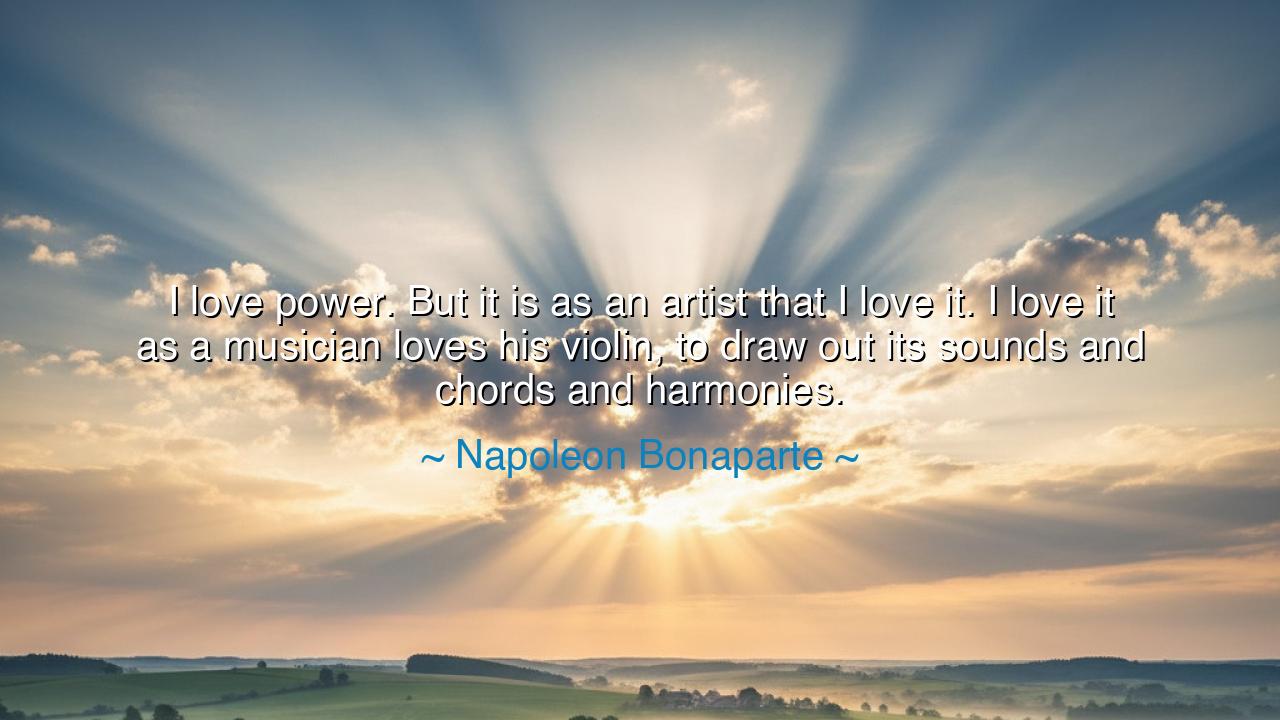
I love power. But it is as an artist that I love it. I love it as
I love power. But it is as an artist that I love it. I love it as a musician loves his violin, to draw out its sounds and chords and harmonies.






“I love power. But it is as an artist that I love it. I love it as a musician loves his violin, to draw out its sounds and chords and harmonies.” — Thus spoke Napoleon Bonaparte, that fiery comet of history whose will reshaped the world and whose ambition still casts its long shadow over time. In this single confession lies not the boast of a tyrant, but the soul of a creator — one who saw in power not merely dominion or control, but a grand instrument, an art, a means through which the spirit might express its highest form. To Napoleon, power was not an end; it was the music by which genius conducts the symphony of destiny.
When he uttered these words, Europe trembled beneath his hand. Kings rose and fell like notes upon the page of his will, and armies marched as if obeying the rhythm of his unseen song. Yet, behind the iron of command, there burned the heart of a poet of action. He loved power not for conquest alone, but for the beauty of mastery — the precision, the vision, the orchestration of human endeavor. Like a musician bending the strings of a violin, he sought harmony in chaos, order in the roar of battle, grandeur in the shaping of nations. To govern, to lead, to create — these were for him the brushstrokes of art upon the vast canvas of history.
Napoleon was a paradox — both destroyer and builder, visionary and tyrant. In his hands, power became a creative force and a consuming flame. He rose from obscurity through the sheer force of will, commanding loyalty, shaping empires, and bending the tides of fate to his design. Yet even he, the master of Europe, understood that true power must possess grace. “As an artist,” he said — not as a brute or despot. For raw might without artistry is but noise; but power guided by vision becomes symphony. It was this belief that separated Napoleon from the ordinary conquerors of men.
There is a lesson in this for all who seek to lead — whether in nations, in work, or in the smaller empires of their daily lives. Power, in its purest form, is not oppression; it is expression. To wield power rightly is to master oneself first — to control one’s passions as a musician controls his strings, to direct energy not toward destruction but toward creation. The wise ruler, the inspired leader, the true artist of life, all understand this: that power divorced from virtue is discord, but power united with wisdom becomes harmony.
History shows that even Napoleon, the great conductor of men, could not sustain the song forever. The same fire that forged his victories also consumed him. When ambition lost its balance with purpose, when the music turned to thunder, the harmony broke. Yet even in his downfall, the echo of his artistry remained. For though empires crumble and titles fade, the beauty of mastery endures. Napoleon’s words remind us that power without art is tyranny, but art without power is impotence. The union of the two is where greatness lives.
Consider, for a moment, the story of Alexander the Great, whose conquests inspired even Napoleon’s dreams. Like Napoleon, Alexander loved power as an artist loves his craft. He did not seek dominion for greed’s sake, but for the glory of creation — to unite cultures, to spread knowledge, to carve a vision of the world that transcended borders. Both men, in their way, treated power as a medium through which the human spirit might shape destiny. Yet both fell when their art became obsession, when the melody of greatness turned into the dissonance of pride.
Therefore, beloved listener, take heed: if you seek power, seek it not as the tyrant does, but as the artist. Let your mastery be tempered with humility, your command softened by understanding. Draw out from the world not shrill cries of submission, but the harmonies of cooperation, the chords of purpose, the music of shared triumph. Power is neither good nor evil; it is the instrument. It sings the song of the hand that holds it.
In the end, this is Napoleon’s true teaching — that power, when guided by vision, discipline, and love of creation, becomes divine artistry. Each soul is given some measure of power — over others, over work, over self. Use it as he did in his finest moments: not to conquer, but to compose. For the world itself is a great and living orchestra, and those who learn to wield their power with harmony shall leave behind not the wreckage of empires, but the immortal music of greatness.






AAdministratorAdministrator
Welcome, honored guests. Please leave a comment, we will respond soon